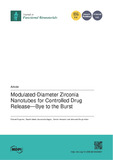Citation link:
https://doi.org/10.3390/jfb16020037Files in This Item:
| File | Description | Size | Format | |
|---|---|---|---|---|
| Modulated_diameter_zirconia_nanotubes.pdf | 2.35 MB | Adobe PDF |  View/Open |
| Dokument Type: | Article | metadata.dc.title: | Modulated-diameter zirconia nanotubes for controlled drug release - bye to the burst | Authors: | Onyenso, Gabriel Vakamulla Raghu, Swathi Naidu Hartwich, Patrick Killian, Manuela |
Institute: | Department Chemie - Biologie | Free keywords: | Oxide nanostructures, Zirconia, Controlled release drug delivery, Anodization, Oxidische Nanostrukturen, Zirkoniumdioxid, Kontrollierte Wirkstoffabgabe, Anodisierung | Dewey Decimal Classification: | 540 Chemie | Issue Date: | 2025 | Publish Date: | 2025 | Source: | Journal of Functional Biomaterials ; 16 (2), 37. - https://doi.org/10.3390/jfb16020037 | Abstract: | The performance of an orthopedic procedure depends on several tandem functionalities. Such characteristics include materials’ surface properties and subsequent responses. Implant surfaces are typically roughened; this roughness can further be optimized to a specific morphology such as nanotubular roughness (ZrNTs) and the surfaces can further be used as static drug reservoirs. ZrNTs coatings are attracting interest due to their potential to improve the success rate of implant systems, by means of better physical affixation and also micro/nano physio-chemical interaction with the extracellular matrix(ECM). Effective control over the drug release properties from such coatings has been the subject of several published reports. In this study, a novel and simple approach to extending drug release time and limiting the undesirable burst release from zirconia nanotubes (ZrNTs) via structural modification was demonstrated. The latter involved fabricating a double-layered structure with a modulated diameter and was achieved by varying the voltage and time during electrochemical anodization. The structurally modified ZrNTs and their homogenous equivalents were characterized via SEM and ToF-SIMS, and their drug release properties were monitored and compared using UV–Vis spectroscopy. We report a significant reduction in the initial burst release phenomenon and enhanced overall release time. The simple structural modification of ZrNTs can successfully enhance drug release performance, allowing for flexibility in designing drug delivery coatings for specific implant challenges, and offering a new horizon for smart biomaterials based on metaloxide nanostructures. |
Description: | Finanziert aus dem DFG-geförderten Open-Access-Publikationsfonds der Universität Siegen für Zeitschriftenartikel |
DOI: | https://doi.org/10.3390/jfb16020037 | URN: | urn:nbn:de:hbz:467-28574 | URI: | https://dspace.ub.uni-siegen.de/handle/ubsi/2857 | License: | http://creativecommons.org/licenses/by-nd/4.0/ |
| Appears in Collections: | Geförderte Open-Access-Publikationen |
This item is protected by original copyright |
Page view(s)
117
checked on Mar 10, 2025
Download(s)
11
checked on Mar 10, 2025
Google ScholarTM
Check
Altmetric
This item is licensed under a Creative Commons License


